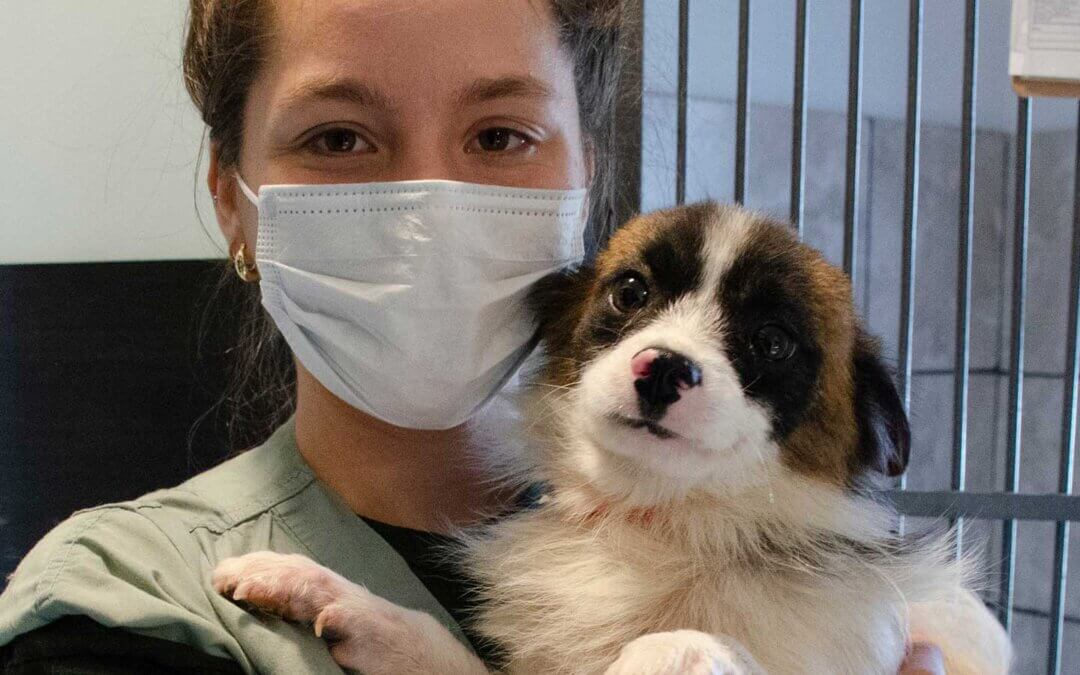MONTREAL, QC (Nov. 2, 2020) – A total of 196 dogs have been rescued by Humane Society International from South Korean dog meat farms and slaughter facilities. Over the past weeks, the HSI Animal Rescue Team quarantined in solitary confinement at a government-approved facility in Seoul before being allowed to head to a dog meat farm in Haemi to rescue 170 dogs, including golden retrievers, a poodle, Korean jindos and mastiffs, Pomeranians, terriers and a Labrador. These dogs, and an additional 26 dogs rescued from previous dog meat farms and slaughter operations, have been transported directly to the United States.
Fifty of the dogs are coming to the HSI/Canada and Friends of HSI emergency shelter located just outside of Montreal, where they will receive the love, veterinary care and rehabilitation therapy they need prior to be placed in forever homes.
Ewa Demianowicz, Senior Campaign Manager for HSI/Canada, said: “We are so pleased to welcome these 50 survivors of the South Korean dog meat trade into our emergency shelter. At last these dogs can receive the specialized care they need to recover from the horrific trauma they have endured. Our expert team will work with these dogs around the clock to make sure each and every one of them gets a second chance and a forever home.”
Nara Kim, HSI/Korea’s dog meat campaign manager, stated at the scene of the dog meat farm rescue: “Every dog meat farm I’ve visited has a horrible stench of feces and rotting food, but there was something different about this dog farm, it had a smell of death. The conditions were truly pitiful, and when we found these dogs they had looks of utter despair on their faces that will haunt us forever. Many of them are covered in painful sores and wounds from neglect, some have inflamed eyes and peer out blindly from their cage. I feel almost grateful they can no longer see this horrible place they live in, and when they finally receive veterinary care and can open their eyes, they will never have to endure this hopelessness again.”
This marks the 17th dog meat farm that HSI has permanently closed down, and coincides with the publication of a new opinion poll showing growing support in South Korea for a ban on dog meat consumption. The poll, conducted by Nielsen and commission by Humane Society International/Korea, shows that 84% of the population say they don’t or won’t eat dog, and almost 60% support a legislative ban on the trade.
Key Poll Findings:
- 84% of South Koreans haven’t consumed dog meat or say they are not willing to consume it in the future.
- 59% of South Koreans support banning dog meat, an increase of 23.9% from 2017, with opposition to a ban at an all-time low (fewer than half (41.4%) of the population.
- 57% of South Koreans believe dog meat consumption reflects poorly on Korea, increasing from 37% in 2017.
Facts:
- Dog meat is most popular in South Korea during the Bok days of summer in July and August.
- Recent crackdowns by authorities to curb the dog meat industry include the shutting down of Taepyeong dog slaughterhouse (the country’s largest) by Seongnam City Council in November 2018, followed in July 2019 by the closure of Gupo dog meat market in Busan (South Korea’s second largest dog meat market after Moran market, which has also closed), and a declaration in October last year by the mayor of Seoul that the city is “dog slaughter free.” In November 2019 a court found that a dog farmer who electrocuted dogs was in violation of the Animal Protection Act, a judgement that could have huge implications for an industry that relies almost entirely on electrocution as a killing method.
- At each dog meat farm closure, HSI has a veterinarian test for the presence of the H3N2 virus (“canine influenza”), at the time the dogs receive their rabies, DHPP and coronavirus vaccines. HSI then quarantines the dogs on the farm or at a shelter for at least 30 days, and the dogs are health certified again prior to transport overseas.
Nielsen online research conducted August/September 2020. Total sample size 1,000 people across six major cities in South Korea (Busan, Daegu, Incheon, Gwangju, Daejeon, Ulsan) weighted and representative of South Korean adults (aged 18+).
Download photos and video of this rescue here.

